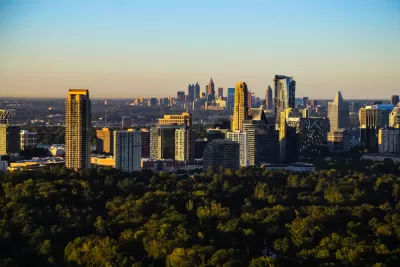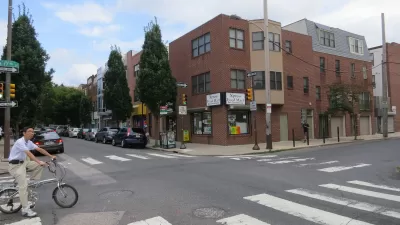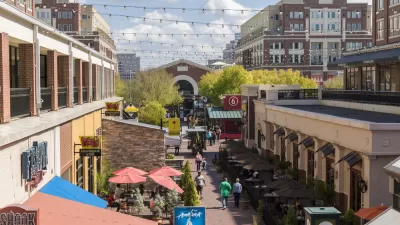One of the most ambitious zoning reform efforts in the country is still in early stages, and the public has taken notice.

The "Atlanta City Design: Housing" initiative launched in January 2021 with the intended purpose of making changes to the city's planning and zoning to improve housing affordability in the growing city. The Atlanta City Design effort is the zoning extension of the One Atlanta Housing Affordability Action plan championed by Atlanta Mayor Keisha Bottoms, which aims to protect or create 20,000 affordable homes.
According to an article by John Ruch, the Atlanta City Design is being greeted in the neighborhood of Buckhead with "fear, skepticism, [and] confusion." Ruch explains more about the initiative and the response:
Among roughly a dozen policy proposals, the plan calls for allowing small apartment buildings in neighborhoods near transit stations, and additional or accessory dwelling units — like basement apartments or rear-yard houses — in all single-family zones. Those ideas — which could become formally proposed zoning ordinances within a couple of months — have drawn formal criticisms from local Neighborhood Planning Units and the Buckhead Council of Neighborhoods.
A statement from Neighborhood Planning Unit B cited in the article, for example, faults the initiative for failing to account for infrastructure capacity or environmental impact. The residents of Buckhead (which has a history of racist land use decisions: "Frankie Allen Park in Buckhead…was created for White residents in the 1940s and ’50s by demolishing the majority-Black neighborhood of Macedonia Park and displacing its residents," explains Ruch) also express concern about the initiative's stated intention to end single-family zoning. But as noted by Ruch, some of the concern is based on a misconception on whether that change would prohibit single-family homes entirely (which it wouldn't).
At the other end of the spectrum of response to the Atlanta City Design: Housing initiative is an article by Bruce Gunter for the SaportaReport:
If you agree on the need for more housing options for those of lesser means; want to do more than plant a yard sign to address systemic racism; and decry the yawning wealth gap between black and white households in Atlanta, then here is an action that will change the trajectory regarding housing supply and racial justice, while building net worth. It is single-family zoning reform, a zoning type covering 63% of the land area of the City of Atlanta.
When it comes to planning and zoning, systemic racism is far from abstract, writes Gunter. "One can draw a straight line from the 1929 zoning map of Atlanta, one of the original and blatant manifestations of Jim Crow, to distressed communities of today, which have long suffered from the debilitating effects of forced isolation and disinvestment, resulting in the pattern of segregation we see today."
FULL STORY: City housing plan draws Buckhead criticism and concerns

Planetizen Federal Action Tracker
A weekly monitor of how Trump’s orders and actions are impacting planners and planning in America.

San Francisco's School District Spent $105M To Build Affordable Housing for Teachers — And That's Just the Beginning
SFUSD joins a growing list of school districts using their land holdings to address housing affordability challenges faced by their own employees.

The Tiny, Adorable $7,000 Car Turning Japan Onto EVs
The single seat Mibot charges from a regular plug as quickly as an iPad, and is about half the price of an average EV.

As Trump Phases Out FEMA, Is It Time to Flee the Floodplains?
With less federal funding available for disaster relief efforts, the need to relocate at-risk communities is more urgent than ever.

With Protected Lanes, 460% More People Commute by Bike
For those needing more ammo, more data proving what we already knew is here.

In More Metros Than You’d Think, Suburbs are Now More Expensive Than the City
If you're moving to the burbs to save on square footage, data shows you should think again.
Urban Design for Planners 1: Software Tools
This six-course series explores essential urban design concepts using open source software and equips planners with the tools they need to participate fully in the urban design process.
Planning for Universal Design
Learn the tools for implementing Universal Design in planning regulations.
Smith Gee Studio
City of Charlotte
City of Camden Redevelopment Agency
City of Astoria
Transportation Research & Education Center (TREC) at Portland State University
US High Speed Rail Association
City of Camden Redevelopment Agency
Municipality of Princeton (NJ)





























